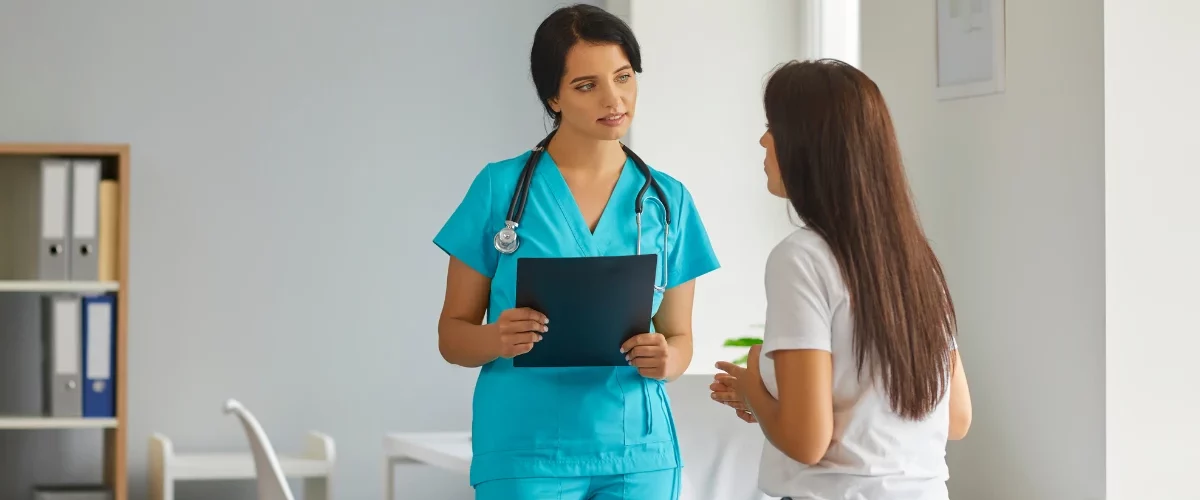A holistic approach to treating uterine fibroids
Uterine fibroids are common, and they don’t always cause problems. When they do, it’s good to know you can rely on gynecology specialists at Maimonides. Your doctor will listen to your concerns and order tests to better understand how uterine fibroids affect your life. Our team takes a holistic approach to your care, tailoring your treatment plan to your unique situation.
What makes uterine fibroid treatment at Maimonides unique?
Treatment for uterine fibroids includes everything from medicine and minimally invasive procedures to advanced surgery. Here’s what sets Maimonides apart.
- Surgical excellence: We are Brooklyn’s only center of excellence for minimally invasive gynecologic surgery. This recognition from the Surgical Review Corporation spotlights our dedication to patient safety and surgical outcomes.
- Research: Our doctors participate in research studies to find more effective, less invasive uterine fibroid therapies.
- Collaboration: Your doctor will work closely with various specialists—other gynecologists and surgeons, fertility doctors, radiologists, and interventional radiologists—to ensure you receive complete, well-coordinated care.
What are uterine fibroids?
Uterine fibroids (also called myomas or leiomyomas) are noncancerous tumors that grow inside the uterus or on the uterine wall. They are muscle cells and other tissues that grow out of control. Uterine fibroids affect between 25 and 30% of women in the U.S. They are even more common in Black women, affecting as many as 80%.
Uterine fibroids can be tiny or grow larger than a grapefruit. You can have just one or many. These tumors are most common in women in their 30s and 40s and usually don’t occur during menopause. Uterine fibroids don’t always cause symptoms. You can have them your whole life and not know it.
Many women discover they have uterine fibroids during a routine pelvic exam. You don’t need treatment unless the tumors are causing symptoms that concern you.
Symptoms of uterine fibroids
Symptoms depend on the size, location, and number of uterine fibroids you have. The most common symptoms include:
- A bloated belly
- Abnormal uterine bleeding (a period that is heavier or more painful than normal)
- Constipation
- Fertility issues
- Frequent urination or trouble urinating
- Menstrual issues, including longer, more painful periods than before, or heavy menstrual bleeding
- Pain during sex
- Pelvic pain or pelvic pressure (discomfort in your stomach area or lower back)
Call to schedule: 718-283-9044
Schedule an appointment online
Diagnostic testing for uterine fibroids
During your appointment, your provider will ask detailed questions about your symptoms and menstrual cycle. They will perform a pelvic exam to see whether you have an enlarged uterus or if it has an irregular shape.
Imaging tests can help your provider learn more. These tests can reveal the size, number, and location of your uterine fibroids. They also can help see whether the uterine fibroids are affecting other organs, such as your colon and bladder. These tests include:
- Ultrasound imaging: This test uses sound waves to create images of the inside of the body.
- Magnetic resonance imaging (MRI): This test uses radio waves and a strong magnetic field to create higher-resolution images inside the body.
- Hysteroscopy: This test uses a thin, flexible tube with a light and camera to see inside the uterus.
- Hysterosalpingography: This X-ray test uses dye to visualize your uterus and fallopian tubes.
Your provider may order lab tests to better understand how uterine fibroids affect your health.
Comprehensive treatment for women with uterine fibroids
At Maimonides, we understand every woman is unique. That’s why we develop individualized treatment plans built around your health concerns, preferences, and needs. We will first consider the least invasive treatment options and provide the information you need to achieve the best outcomes possible.
After your test results are available, your provider will talk to you about your treatment options, which may include:
- Medicine
- Minimally invasive procedures
- Surgery
Many women with uterine fibroids have concerns about how treatment will affect their ability to become pregnant. We share those concerns about infertility. Our doctors consider the least invasive therapies first, doing all they can to protect your fertility if that is important to you.
Medicine for uterine fibroids
Medicine can help ease the symptoms of uterine fibroids, but it won’t make them go away. Your provider may prescribe medicine to:
- Reduce heavy bleeding during your periods
- Stop your periods temporarily
- Shrink the fibroids
Your provider will talk to you about the potential benefits and downsides of taking these medicines.
Call to schedule: 718-283-9044
Schedule an appointment online
Minimally invasive procedures for uterine fibroids
Minimally invasive procedures allow the specialist to treat uterine fibroids without cutting into the uterus or removing it. The procedures can:
- Cut off the blood supply to the fibroids, causing them to shrink
- Target the uterine fibroid with radiofrequency energy to destroy the tissue (radiofrequency ablation, or RFA). Maimonides was the first hospital in Brooklyn to offer RFA for uterine fibroids.
Surgeons may use robotic surgery to treat uterine fibroids. This minimally invasive technique offers highly detailed views of the surgical area and precise control of surgical instruments.
Uterine fibroid surgery
Surgery is sometimes the most effective way to treat uterine fibroids. Surgery can:
- Shave down the fibroids from the inside out
- Remove the fibroids (via a procedure called a myomectomy)
- Remove the uterus (hysterectomy) and other reproductive organs affected by the fibroids, such as the fallopian tubes and cervix
Surgery for uterine fibroids is almost always outpatient, so you’ll go home the same day. Our surgeons use minimally invasive techniques to ensure you recover as quickly as possible.

